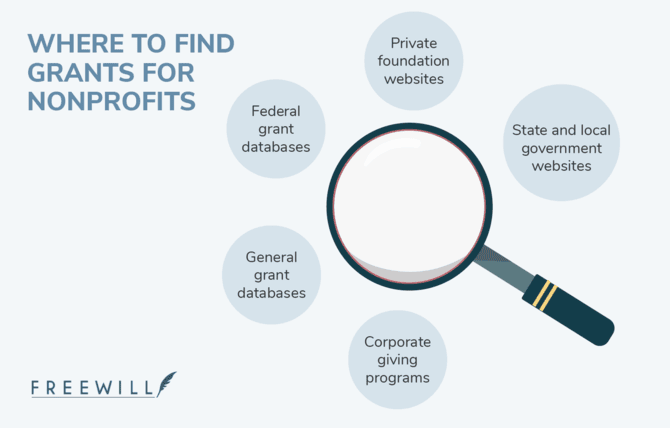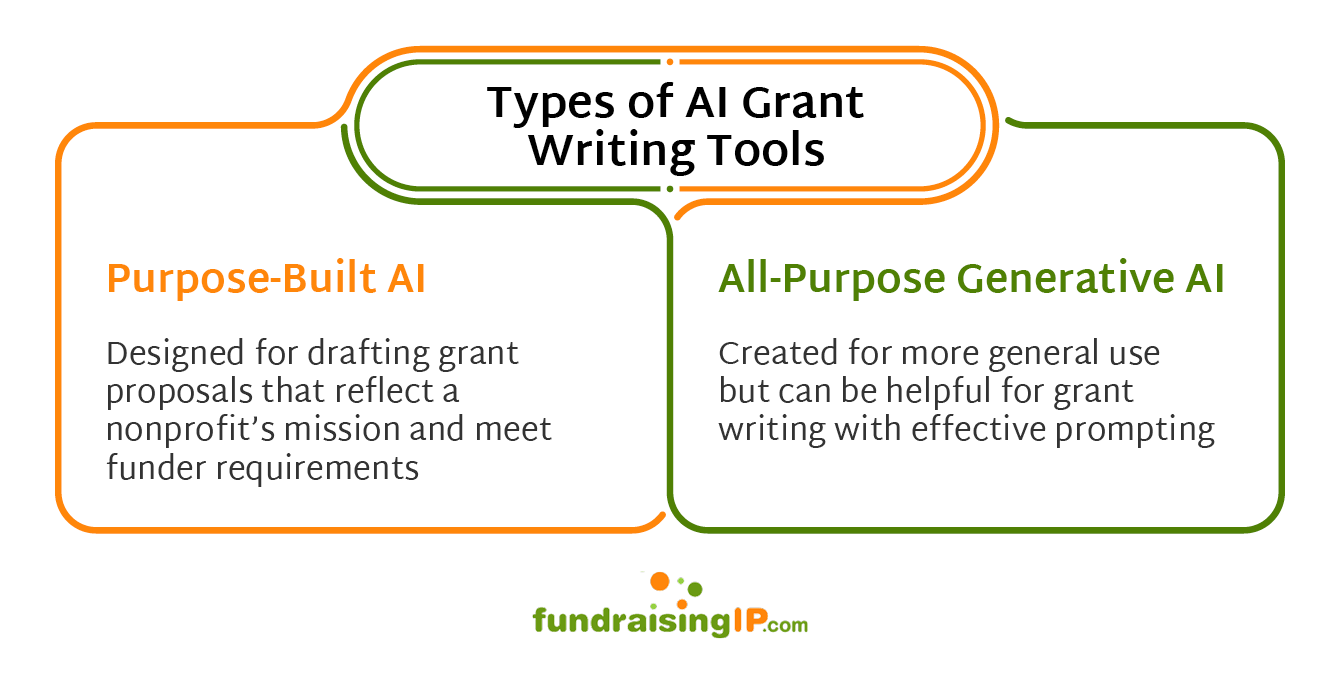A successful grant management strategy is about more than compelling writing (though that’s a very important part). It’s about using the right tools at every stage of the process. From identifying the best grant opportunities to submitting polished proposals to tracking outcomes, modern tools make it easier for nonprofits to secure and manage funds.
Each type of tool is optimized for a different phase of the grant lifecycle, giving you plenty of options for saving time, reducing stress, and boosting your overall success rate. The exact tools you invest in will depend on the gaps your team needs to fill, whether that’s drafting proposals or managing grant funding.
To help you find the best resources, we’ll break down the key types of nonprofit grant tools available and how they can elevate your team’s workflow from start to finish.
Grant Research Tools
Before you submit a grant proposal, you need to find the right opportunities to apply for. That’s where grant research tools come in. These platforms help nonprofits search for funders based on mission alignment, grant size, geographic area, and other criteria. They act as intelligent search engines that sift through thousands of opportunities so you don’t have to.
Grant research tools can save your nonprofit countless hours and ensure you find and apply for grants with higher odds of success. They also help smaller organizations with fewer resources compete by making high-quality funder data accessible and actionable.
Specific categories of research tools that make it easy to find nonprofit grant opportunities include:

- General grant databases: Tools like Foundation Directory and GrantStation aggregate grant opportunities across multiple sectors and funder types, making it easy to cast a wide net.
- Federal grant databases: Platforms like Grants.gov provide access to government-sponsored opportunities from federal agencies.
- State and local government websites: These sites focus on funding opportunities available specifically through state departments or municipal programs.
- Private foundation websites: These are maintained by foundations (e.g., the Ford Foundation or Gates Foundation) and often include application instructions, eligibility guidelines, and examples of past grant recipients.
- Corporate giving databases: These tools help identify companies that offer different types of philanthropic support, including grant programs, sponsorships, and community investment initiatives.
How Grant Research Tools Help Nonprofits
- Aggregate thousands of grant opportunities into searchable databases
- Enable filtering by cause area, location, funding type, and deadlines
- Provide profiles on funders and their previous giving history
- Offer alerts for upcoming deadlines or new opportunities
Collaboration and Workflow Tools
Applying for and actively managing grants requires a lot of moving parts. Chances are, you’ll need input from multiple departments. However, a missed deadline or unclear task assignment can jeopardize funding, and it only gets more complicated if you’re managing multiple grants at once.
Collaboration and workflow tools streamline important aspects of the process, ensuring everyone stays aligned and on schedule. They provide transparency into what needs to be done, who’s responsible for it, and when it needs to be finished. For example, a team might use Trello to create a grant proposal board with labeled columns for each stage—like ‘Research,’ ‘Writing,’ ‘Review,’ and ‘Submission.’ This way, everyone knows exactly where the project stands and what needs to happen next.
How Collaboration Tools Help
- Assign tasks and set deadlines
- Track progress on grant deliverables
- Centralize documents and communication
- Provide templates and approval flows for common tasks
AI Grant Writing Software
Artificial intelligence (AI) is transforming nonprofit workflows, including how we fundraise, market campaigns, and even complete grant applications!
Instead of starting from a blank page, AI grant writing assistants generate tailored proposals quickly and accurately. There are two types of tools to be aware of:

- Purpose-built AI software (like Grant Assistant by FreeWill) is specifically designed for nonprofit grant writing. It’s able to prepare, research, and draft grant proposals that reflect your project and unique tone effectively.
- All-purpose generative AI software (like ChatGPT) is designed for more general use but can be helpful for parts of grant writing with effective prompting.
We recommend choosing purpose-built AI software because it understands the nuances of grant writing. These tools learn from funder data and your organization’s past writing to create customized, high-impact proposals. Unlike general tools (which require extensive customization and prompting), a specialized platform instantly aligns with your organization’s voice and strategy, helping you produce compelling, funder-ready proposals with minimal effort.
Note: Whenever you use AI, you’ll still want to involve human reviewers in the process to ensure that your mission and expertise are represented accurately. Some large language models (LLMs) will have AI hallucinations. This means they’ll generate incorrect or nonsensical responses and present them confidently just to be helpful to users, so it’s important to always fact-check.
How Purpose-Built AI Grant Writing Tools Help
- Quickly understand opportunities to help you prioritize grants
- Analyze requests for proposals (RFPs) and other documents to suggest relevant responses
- Articulate your mission, proposed project, reporting plan, and sustainability plan clearly
- Draft proposals with your nonprofit’s specific tone and goals
- Adapt writing style based on funder expectations
- Highlight gaps and recommend improvements in proposals
Grant Management Software
Grant management software helps nonprofits oversee the entire grant lifecycle, from tracking deadlines to reporting outcomes. It consolidates many of the features you need to effectively apply for and manage funding opportunities. For example, you might not need to invest in an external workflow tool to keep track of tasks if you have grant management software on your side.
Jitasa’s guide to grant management highlights several challenges nonprofits face, such as meeting funders’ complex compliance requirements, following inconsistent reporting demands, and juggling multiple grants at once. If you fall short, you might even encounter funds being withheld or even legal consequences.
Grant management software can mitigate those challenges! These tools help you keep track of your obligations, maintain funder relationships, and turn complex processes into manageable checklists and timelines. Proper grant management will ultimately boost your chances of future awards since you’ll more effectively manage funds and build a reputation of reliability in the grantmaking community.
How Grant Management Software Helps
- Maintain all grant-related documents—including applications, contracts, and reports—in a single location
- Assign tasks to team members
- Set reminders for important deadlines to ensure on-time submissions and reports
- Track budgets and expenditures and produce financial reports
- Generate reports and dashboards tailored to specific funder requirements
Wrapping Up
With so many moving parts to every grant, relying on memory or manual tracking can leave your team vulnerable to missed opportunities or compliance issues. That’s where digital tools step in—not to replace your expertise, but to amplify it. By implementing the right solutions, your team can reduce administrative overhead, improve collaboration, and consistently submit stronger, more competitive applications.
Whether you’re building your grant strategy from the ground up or refining your existing approach, these tools give your organization the foundation it needs to fund meaningful, mission-driven work for years to come.
